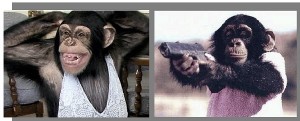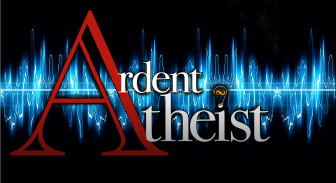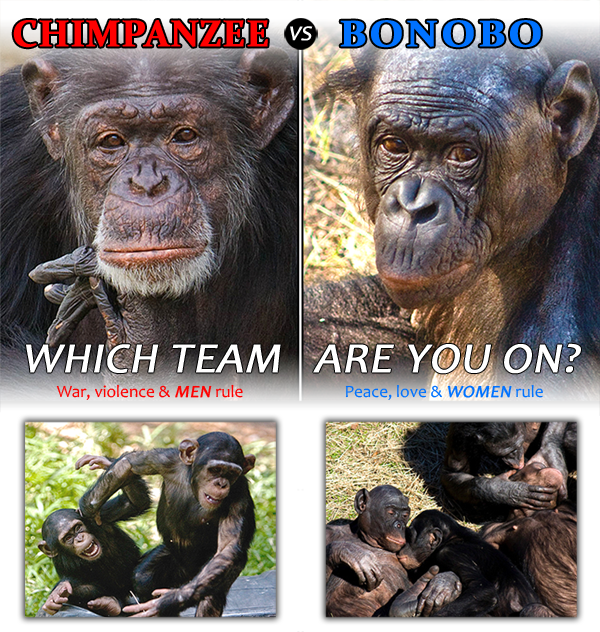UPDATE 12/29 See part 2 of this post here, where a primatologist responds, essentially agreeing with the other primatologist I cited below.
Among wild bonobos there’s no deadly warfare, no male dominance, and enormous amounts of sex. They make love, not war. —Frans de Waal

While many think humans are or should be more like bonobos, we should hope that is not true. In fact, few would find bonobo sexuality, properly understood, desirable even were it possible to be more like them.
This past year I have met perhaps the two biggest advocates for the advancement of public understanding of bonobos: Frans de Waal and Christopher Ryan. de Waal has often and loudly decried the shameful treatment of bonobos, who are among our nearest ape cousins, by science journalism and perhaps researchers in general. Peaceful and highly sexual bonobo society has been embarrassing to report on. Particularly so in light of the obvious homosexuality and promiscuity. Meanwhile Christopher Ryan’s bestselling Sex at Dawn is largely based on the idea that humans are more like bonobos than they are like chimpanzees. 
Listen to Ryan and I discuss monogamy and evolution on the Ardent Atheist Podcast. Podcast may feature graphic language and is not intended for children; Possibly NSFW.
Listen on the web.
Listen on iTunes.
Plan it of the apes?
Ryan and numerous websites have politicized and moralized bonobo peacefulness and sexuality, making claims that they are evidence that the (human) monogamy status quo is fiction or that we may choose to be more like the bonobos and less like the chimpanzees should we wish to. Many people who are polyamorous or pro-poly are quite taken with Ryan’s work and apparent anti-strict monogamy message. Here’s a brief round-up of such websites:
Monogamy is not a natural state for men OR women… controversial TED lecturer claims that we are all built to be promiscuous
Salon.com | “Sex at Dawn”: Why monogamy goes against our nature
Buzzfeed | 11 Reasons Why Bonobos Are The Sexiest Primates
ABC | Sexy Beasts: Bonobos Make Love, Not War
There is much to like about bonobo society, especially if you are comparing them to chimpanzees. Low infanticide, sex for social bonding and conflict resolution, common sexual acts between any two sexes, and very little violence in general. Some of the details also seem uniquely shared by bonobos and humans: face-to-face sex with eye contact, tongue kissing, oral sex, and perhaps orgasm in females and males. These are some of the facts that are often referred to, but they paint a superficial picture of bonobo sexual life. The deeper implications make the picture much less rosy.
Sex among bonobos is usually about 10 seconds in duration. Most often, it does not appear to involve orgasm by either individual, no matter the sexes. They do not appear to have long term sexual relationships of any sort (though long term socially bonded associates may at times have sex). de Waal and others often describe sex being used to “defuse tension” or stress. Author Vanessa Woods wrote a book called Bonobo Handshake, after observing that their “sex is as common and friendly as a handshake.” Encounters may be fleeting, casual gestures never necessarily indicative of emotional connection.

Sexual jealousy, which is closely associated with cultural ideas of monogamy, is taken to be an ugly, harmful thing. It certainly can be. It’s often a motive for assault or murder among men and casual infanticide among chimpanzees. But not bonobos. Male bonobos do not know which are their offspring, and the young also do not require paternal provisioning of food or protection to successfully reach adulthood. The group cooperative sees to that. So, socially speaking, there are no bonobo fathers, only sperm donors. There are no pair-bonds, no mates. There are simply no enduring sexual relationships between males and females at all. So a primate species can, in principle, jettison this ugly sexual jealousy stuff. All that it costs is what we tend to call love, limerence, romance, romantic attachment/bonding, romantic intimacy, and the idea and practice of fatherhood or even “family” outside of the mother/offspring component. What that leaves of sex is frequent, enjoyable, but maximally superficial “handshake” encounters. Opinions shall vary on the value of this hypothetical trade, but my opinion is that the “sexy” bonobo arrangement is among the least-sexy that I can imagine.
Yang
There is a down side to everything great about humans, the other side of the proverbial coin. We have a competitive drive that can bring out the worst, and the best. We have ingenuity as useful to making new guns as making new cures for terrible diseases. The love we have for each other, the incalculable value put in relationships can lead us to do awful things to secure or protect them. We should seek to finds ways to reduce the harmful consequences (after all, we have the ingenuity!), rather than admire a real or hypothetical society that doesn’t have the harm because it doesn’t have the love. We need the love.
The politics
I am not arguing for monogamy or for conventional sex roles or any such thing, nor against casual sex, no matter how casual. Indeed, the meaning that I think we should not trash is inclusive of the various arrangements (casual or otherwise). Bonobos aren’t polyamorous because they aren’t really amorous to begin with. Regardless of the why’s, humans have loads of variation in what sorts of relationships they want to have. Provide no harm is involved, adults should be at liberty to live as they choose and fornicate with whomever they wish to. We don’t need to believe anything about our species history to think that, we only need to reason about basic ethics of fairness and use a little common sense. All else the same, freedom is better. There’s no sound moral argument to the contrary, whether or not we survey what other apes think about it.
Peaceful primates?
A primatologist colleague has educated me that bonobos have not had extensive longitudinal research conducted, and findings of the peaceful nature of bonobo society might be premature. For example, Jane Goodall thought chimpanzees, which we now find so violent and aggressive, were quite peaceful animals even after years of observation. A similar trajectory of understanding has occurred in other primate studies. It’s also worth pointing out that rather than male dominance, there is female dominance, and the dominance is maintained with violence:
Females that have strong bonds keep males away from food and often attack males, biting off their fingers and toes (de Waal 1997).
A violence-sustained mob dominance is hardly laudable, regardless of the type of genitals of the mobsters. Female-dominated hyena societies are just as brutal and violent as the male-dominated ones, so perhaps the alignment of maleness and aggression-dominance as a biological rule is inapt. But in any case, bonobo society is hardly what anyone would call egalitarian. I hope it is obvious how inappropriate it is to judge another species by human standards, as I am doing here. I would ordinarily not think to do so, but this essay is in reply to those who are conducting such reasoning and I think it is important to drive home the full implications of such flawed perspective.
Evolutionary import for humans?
Does the peaceable, matriarchal, and free-sex society of the bonobos say something about what we “used” to be like? Chimpanzees, humans, and bonobos diverged about 7 million years ago and chimps and bonobos split only about 1 million years ago. The more violent and less-sexy chimps seem to be that way regardless of their “cultural” trappings, as do bonobos. Part of the reason for our differences is biological. Since it only took, at most, a million years for the ancestral species of chimps and bonobos to differentiate pretty radically in these ways, and we diverged from both 6-7 million years ago it seems unreasonable to presume the common ancestor of 3 species so different in these ways must have been just like one and not the other two. The ecologies of the species through time and their unique trajectories and constraints are probably key to understanding the different outcomes, and an argument of past similarity must rest of such considerations. No such argument has been advanced, to my knowledge. Frans de Waal has written to the contrary in his book Our Inner Ape:
Some Anthropologists, such as Margaret Mead, relying on informants rather than firsthand observation, have created a romantic fiction that is still with us today. But even the most sexually liberal cultures are not free from jealousy and violence in response to unfaithfulness. Universally, intercourse takes place in private, and the genital region tends to be hidden. That even the early Hawaiians knew chastity is suggested by their word for loincloth, malo, the most likely origin of which is malu, the Malayan word for “shame.” Most societies also limit sex to a few partners. Polygamy may be practiced and accepted, but in reality the vast majority of families in the world include only one man and one woman. The nuclear family is the hallmark of human social evolution. Given the exclusivity of our sexual contacts, we’ve opted for the opposite of the bonobo plan by actually enhancing a male’s ability to tell which offspring are his. Until modern science came along, men could never be sure, but had a far better chance of guessing right than a bonobo does. (emphasis mine)
Being determined, not determinate
Regardless of what our phylogeny is like or who is closest among our living cousins, humans are equipped with a variety of innate capacities they can use to improve life for everyone, like the ability to reason and senses of fairness, compassion, and justice. We can, and have, reduced rates of violence. We can, and have, increased sexual liberty. There is every reason to suspect human society will improve along these lines in the future. Not because we’re like bonobos or chimps, but because we are not.
